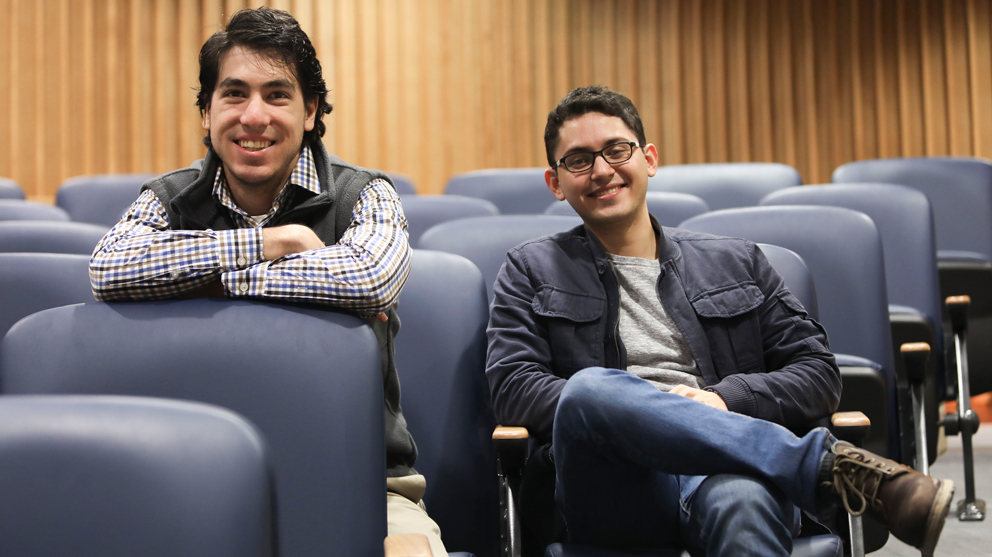 Christian Monroy Hernandez (right) and Danya Gordin. JAX photo by Thomas Fouchereaux.
Christian Monroy Hernandez (right) and Danya Gordin. JAX photo by Thomas Fouchereaux.Christian Monroy Hernandez and Danya Gordin came to JAX’s new post-baccalaureate research program — PostBacc @ JAX — to get ready for an MD-PhD. The PostBacc @ JAX is for recent college graduates who want to continue with advanced biomedical degrees, but who also want time to make their applications as strong as possible.
"The JAX post-baccalaureate research program gives an excellent combination of independence and guidance to balance the lab responsibilities and to get all the MD-PhD application materials in order," Monroy Hernandez says.
Monroy Hernandez and Gordin both want to pursue MD-PhD degrees so that they can help patients directly, in the clinic, and indirectly, in the lab, doing research aimed at better understanding and curing diseases. Physician-scientist training is rigorous, and programs are seeking candidates who have shown the dedication and motivation needed for success. Both Monroy Hernandez and Gordin came to PostBacc @ JAX with exemplary academic records, but they wanted to gain more experience.
“I came to JAX because I wanted a unique post-baccalaureate experience — something that would help my MD-PhD application stand out,” Gordin says.
Gordin began his post-baccalaureate in autumn of 2017, in the first cohort of PostBacc @ JAX participants. He spent one year in the lab of Associate Professor Greg Cox, Ph.D.Studies the genetics of degenerative muscle diseases using mouse models for SMA, ALS, muscular dystrophy and more.Gregory Cox, Ph.D., working with postdoctoral associate Amy Hicks, Ph.D., to investigate a mouse that models the human disease Spinal Muscular Atrophy (SMA). He is spending his second year in the program developing his computational skills in the lab of Assistant Professor Mingyang Lu, Ph.D.We are passionate about the development and application of computational modeling methods to study the operating mechanisms of cancer genetic networks.Mingyang Lu, Ph.D., where Gordin is looking at gene networks involved in cancer.
Monroy Hernandez has been at JAX for about four months, having come to Bar Harbor, Maine, from New Orleans. This move north was prompted by his interest in how genetics influences someone’s susceptibility to addiction. At JAX, Monroy Hernandez works with Professor Elissa Chesler, Ph.D.Develops software tools and resources for multi-species data integration in the study of health and disease and researches the genetic and biological basis for relationships among behavioral traits including addiction and other behaviors.Elissa Chesler, Ph.D. and Research Scientist Jason Bubier, Ph.D., to understand how genetics and environmental factors like stress contribute to addiction.
According to Monroy Hernandez, JAX provides an exceptional environment for scientists-in-training. "I like the environment here at JAX,” he says, “because I have the flexibility to explore topics I’m interested in and the resources and opportunities I need to succeed."